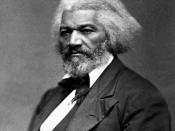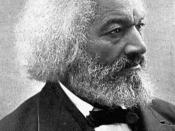Mahatma Gandhi once said, "The moment the slave resolves that he will no longer be a slave, his fetters fall...freedom and slavery are mental states." This simple quote symbolizes the lives of Frederick Douglass and Olaudah Equiano. Both of which were slaves who tried to free themselves. Both Douglass and Equiano have wrote a narrative about their lives, however, each one is different in its own unique way.
From the bonds of slavery on a plantation to the call of freedom from the north, his life was filled with hopes of improvement for both himself as well as his fellow slaves.
Frederick Douglass was an unusual character. Even in the bonds of slavery, he didn't consider himself to be owned by anyone else. His mind and soul were his own and his masters were never able to crush his spirit for long.
Their masters very harshly put upon slaves of the United States.
Most of the slaves lived on plantations and farms where they worked in the fields. They worked from sun-up to sunset in all kinds of weather. Slaves in the fields seldom got enough food, clothes, or supplies to last them throughout the entire year. According to Fredrick Douglass, the slaves received eight pounds of pork or fish, and one bushel of corn meal as their monthly allowance of food. Every year, the slaves also got new clothes because the ones from the year before were falling apart. They received two linen shirts, one pair of linen trousers, one jacket, one pair of winter trousers, one pair of stockings, and one pair of shoes. The children of the slaves had it even worse for they received only two shirts per year. The adults were also given one coarse blanket a year while the children had none.



I like this...
Great essay. Not only do you cover specific facts of slavery, but you also discuss both Douglass' and Equiano's narratives. You have a very easy to follow and simple style.
0 out of 0 people found this comment useful.